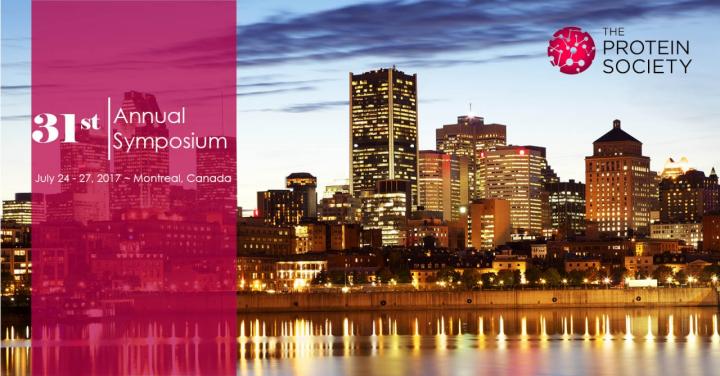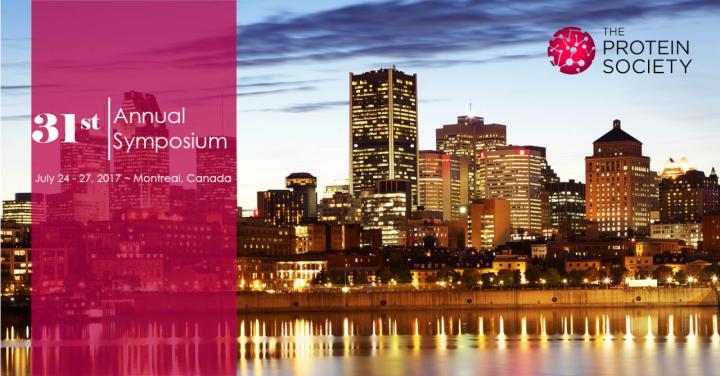
Credit: The Protein Society
The Protein Society, the premiere international society dedicated to supporting protein research, announces the winners of the 2017 Protein Society Awards. The awards will be conferred at the 31st Annual Symposium of The Protein Society (July 24 – 27, 2017, Montreal, Canada). Plenary talks from each recipient are scheduled throughout the 3.5-day event.
The Carl Brändén Award, sponsored by Rigaku Corporation, honors an outstanding protein scientist who has also made exceptional contributions in the areas of education and/or service to the field. The 2017 recipient of this award is Dr. Billy Hudson (Vanderbilt University). Dr. Hudson has worked tirelessly to develop the Aspirnaut K-20 STEM Pipeline for Diversity Program that provides internships to an untapped pool of talented high-school students to encourage them to work in the STEM fields and go on to college. Hudson's outstanding research accomplishments include seminal discoveries about the structure and chemistry of collagen IV scaffolds in extracellular basement membranes and have led to a potential treatment of diabetic kidney disease.
The Christian B. Anfinsen Award, sponsored by The Protein Society, recognizes technological achievement or significant methodological advances in the field of protein science. The recipient of this award in 2017 is Dr. Lewis Kay (University of Toronto). Dr. Lewis Kay has been involved in developing a large number of ground-breaking tools and approaches that have revolutionized NMR spectroscopy and have rendered it one of the most powerful techniques in protein science. The research in Dr. Kay's laboratory focuses on the development of NMR techniques for studying macromolecular structure and dynamics and the application of NMR techniques to problems of biological and clinical importance.
The Dorothy Crowfoot Hodgkin Award, sponsored by Genentech, is granted in recognition of exceptional contributions in protein science which profoundly influence our understanding of biology. The 2017 award will be presented this year to two deserving nominees. The first is Dr. Juli Feigon (University of California, Los Angeles). Feigon's structural studies on proteins has largely evolved around proteins interacting with DNA or RNA, and has revealed interactions crucial to understanding DNA repair and regulation of gene expression. Feigon's recent accomplishment is structural analysis of the Tetrahymena telomerase complex, a multisubunit riboprotein complex responsible for the maintenance of telomeres. The structures provide new mechanistic knowledge of telomere function associated with aging and cancer.
The co-recipient of the Dorothy Crowfoot Hodgkin Award is Dr. Manajit Hayer-Hartl (Max Planck Institute of Biochemistry). For the past 2 decades Dr. Hayer-Hartl has investigated the mechanism of GroEL and its co-factor GroES. This work led to the insight that the chaperonin, in addition to preventing aggregation, profoundly influences the free-energy landscapes for some proteins by accelerating folding through entropic destabilization of unfolded states in the confining environment of the folding cage, a mechanism that can be considered specific to chaperonin.
The Emil Thomas Kaiser Award, sponsored by The Protein Society, recognizes a recent, highly significant contribution to the application of chemistry in the study of proteins. The 2017 recipient is Dr. Thomas Muir (Princeton University). Muir is known for his innovative work to develop semisynthetic approaches, known as "expressed protein ligation," to manipulate covalent structure of proteins. By combining tools of organic chemistry, biochemistry and cell biology, Muir has developed a suite of new technologies for making proteins with defined post-translational modifications, enabling functional studies of how proteins work that would otherwise not be possible. The chemistry-driven approaches pioneered by the Muir lab are now widely used by chemical biologists around the world.
The Hans Neurath Award, sponsored by The Hans Neurath Foundation, seeks to honor individuals who have made a recent contribution of exceptional merit to basic protein research. In 2017, the Hans Neurath Awardee is Dr. Kazuhiro Nagata (Kyoto Sangyo University). Nagata has made fundamental discoveries advancing our understanding of protein quality control in the endoplasmic reticulum. Dr. Nagata's research focuses on functional analysis of collagen-specific molecular chaperone, Hsp47; functional analysis of mammalian ER quality control and ER-associated degradation; and ER-associated degradation of misfolded proteins by the EDEM-ERdj5 system.
The Stein & Moore Award, sponsored by The Protein Society, is named for Nobel laureates Dr. William Stein and Dr. Stanford Moore. The award is given to recognize eminent leaders in protein science who have made sustained high impact research contributions to the field. The 2017 recipient is Dr. John Kuriyan (University of California, Berkeley). Kuriyan's major scientific contributions have been in understanding the regulation of eukaryotic cell signaling and the phenomenon of processivity in DNA repair. His contributions include seminal studies on the structural basis of regulating protein interactions and molecular mechanisms associated with cancer. These insights come from work on protein kinases such as the Src-family kinases, Abelson tyrosine kinase, the epidermal growth factor receptor and Ca2+/calmodulin-dependent kinase II.
The Protein Science Young Investigator Award, named for the academic journal of the Society, recognizes a scientist within the first 8 years of an independent career who has made an important contribution to the study of proteins. The 2017 recipient is Dr. David Pagliarini (University of Wisconsin, Madison). From the earliest point in his career, Pagliarini has made substantive and lasting contributions to our understanding of mitochondrial protein function. Taking an interdisciplinary approach, Pagliarini has revealed a large number of mitochondrial proteins have no established function, and many are associated with human disease. His goal is to use a range of techniques to connect "orphan" proteins with mitochondrial pathways and processes.
###
Media Contact
Raluca Cadar
[email protected]
844-377-6834
@ProteinSociety
http://www.proteinsociety.org
############
Story Source: Materials provided by Scienmag





